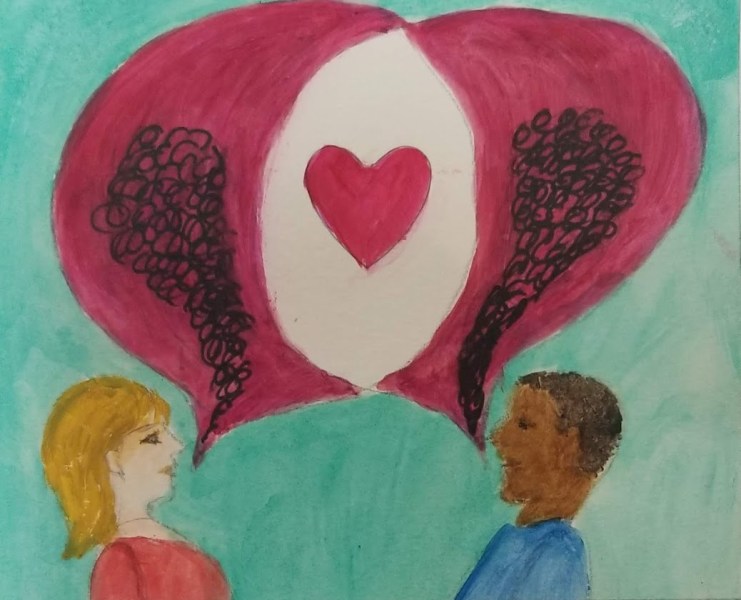Painting by Belynda Wilson thomas
Every day is a chance to change your life. Unknown
Do we say what we mean and mean what we say, or do we say what we think we should say but our body language gives the real message? Haven’t we all seen a blank look, a dismissive shrug, an averted gaze, or a roll of the eyes, and felt the impact of unspoken communication.? We give them as well and we hear experts talk about body language. Our nonverbal gestures can make or break our relationships.
I take my dog out for a walk and most of the time she walks along with no fuss, meeting and greeting dogs, or we let them pass, but every now and then there is snarling and barking. I never know what brought that on. Until they get to the snarling and barking it’s all non-verbal. We are the same; we aren’t warm and fuzzy with everyone.
How we make people feel brings out the best or the worst in them. When our smile brightens when we see someone we make them feel good, we feel good seeing them, and they feel good being seen. How are we to react to the people who are just there, we aren’t particularly glad to see them, or they us, they never offer much in the way of fun or laughs, we don’t connect on any level. It can be awkward if we connect with someone and have a warm relationship with one person and a cool one with another, what if we are the boss, the in-law, parent, or someone in authority that can make things happen?
How does it affect our families, workplaces, and schools when we have in-groups and out-groups? I’m reading a book called, “Micro Messaging,” by Stephen Young Why Great Leadership is Beyond Words. We know great leadership is beyond words, we’ve all watched families and wondered how they stay close and connected, their children feel loved and encouraged, and work hard to build lives they and their parents are proud of.
We see sports teams turn around with a new coach. We know they didn’t bring new skills; they brought a new attitude to the team. We pay a lot of money to people who bring out the best in others and turn companies around. We are looking for political leaders that give confidence to the country at large. We make judgments by what they say, how they say it, and who they surround themselves with, what looks come across their face when others speak. We want people to be congruent, that what they say is what they mean.
The world as we have created it is a process of our thinking. It cannot be changed without changing our thinking. Albert Einstein
Are we congruent, do we say what we mean and mean what we say? In this book, a woman got help from someone and at the end of an email, it said. “You owe me big girl.” Being a woman larger than she liked she didn’t know how to take it. She thought they had an okay relationship but here it was in the plain text telling her she was fat or was it? She asked the woman who sent it, “If you were putting a comma in this sentence where would you put it?” The woman put the comma in, “You owe me big, girl.” When you put the comma there it says something different than how she originally took it.
Can we be misinterpreting and taking offense when none is meant? Are we offending others when we don’t mean to? I’ve been guilty of that. I am guilty of not looking at people who ask for money. I think it is a failing of mine, instead of acknowledging them and not giving them money, I don’t acknowledge them which wouldn’t cost me anything. Even if I do give money I think I often don’t look them in the eye. Am I pretending there isn’t a problem if I don’t acknowledge it?
We can’t change what we don’t acknowledge, and we only have the power to change ourselves. What if the power to drive change lies in the small things and not the big things? What if ants drive more change than elephants?
In Micro Messaging Stephen Young gives us ten tips to turn around problem relationships.
Actively solicit opinions.
Connect on a personal level.
Constantly ask questions.
Attribute/credit ideas.
Monitor your facial expressions.
Actively listen to all.
Draw in participation.
Monitor personal greetings.
Respond constructively to disagreements – one way is to ask a question.
Limit interruptions.
We can do this with any relationship without violating values or misrepresenting our opinions of others. Can we by using these tips unlock participation, creativity, innovation, and make things better?
Be careful of your thoughts, they become words. Be careful of your words, they become actions. Be careful of your actions, they become habits. Be careful of your habits, they become character. Be careful of your character, it becomes your destiny. Unknown
One pen, one child, and one teacher can change the world. Malala Yousafzai
True life is lived when tiny changes occur. Leo Tolstoy
Thank you for reading this post. I hope you enjoyed it. I hope you will come back and read some more. Have a blessed day filled with gratitude, joy, and love.
To subscribe, comment, see archives or categories of posts click on the picture and scroll to the end.
Thank you to everyone that reads my books. A special thank you to those who leave a review on Goodreads, and Amazon. If you purchase an item through the Amazon link I receive a small percentage of the sale through the Amazon affiliate program.




























 Date: April 5, 2025
Date: April 5, 2025 Time: 10:00 AM – 2:00 PM
Time: 10:00 AM – 2:00 PM Location: Meadowvale Village Hall, 6970 Second Line West, Mississauga, ON Event Schedule
Location: Meadowvale Village Hall, 6970 Second Line West, Mississauga, ON Event Schedule  […]
[…]